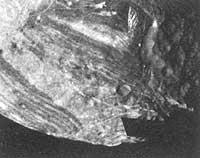Surface of the Miranda
The ice would give Miranda's surface its broken and worked appearance. According to physicist Steven Croft of the University of Arizona, this peculiar form of ice was formed when Miranda was born.

Two and a half years ago, the images emitted by the Voyager 2 spacecraft captivated the planetologists. The surface of Miranda is full of remains of tectonics and volcanic activity. This is totally surprising, since Miranda is very small (450 km in diameter) and does not have enough size to have the inner heat necessary to produce these phenomena. MIranda required a geologically dead world full of impact craters.
Voyager showed another image. Miranda has craters, but Miranda's entire surface is a strange mixture of geological phenomena. This moon is rotated by a large network of cannons. The canyons are between 30 and 40 km long and between 3 and 5 km deep. On the other hand, the funds of some impact craters are covered by a magmatic structure that can represent vulcanism.
According to Croft, to explain these structures there is no need to resort to vulcanism or tectonics, since they can be expressed with ice.





